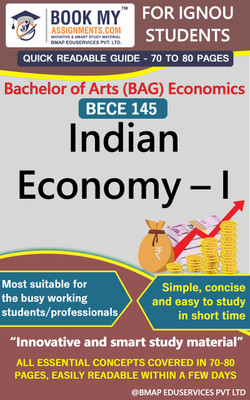IGNOU BECE 145 Indian Economy ŌĆō I Quick Readable Notes Book For Ignou Student(Paperback, BMA Publication)
Quick Overview
Product Price Comparison
IGNOU BECE 145 "Indian Economy ŌĆō I" are not available. However, I can provide a general overview and key topics that are typically covered in an introductory course on the Indian economy:1. Introduction to Indian EconomyOverview of the structure, composition, and key sectors of the Indian economy.Understanding the significance of the Indian economy in the global context.2. Economic Development in IndiaHistorical perspectives on economic development in India, including pre-independence and post-independence periods.Analysis of major economic reforms and policy initiatives aimed at promoting economic growth and development.3. Economic Planning and PolicyUnderstanding the role of economic planning in shaping India's development trajectory.Analysis of key policy frameworks, such as Five-Year Plans, and their impact on economic growth, poverty reduction, and social welfare.4. Agriculture SectorOverview of the agriculture sector in India, including land tenure systems, cropping patterns, and agricultural practices.Analysis of government policies, agricultural reforms, and initiatives aimed at improving agricultural productivity and rural livelihoods.5. Industrial SectorUnderstanding the structure and dynamics of the industrial sector in India, including manufacturing, mining, and infrastructure.Analysis of industrial policies, investment incentives, and challenges facing the industrial sector.6. Service SectorOverview of the service sector in India, including IT services, tourism, finance, and healthcare.Analysis of trends, growth drivers, and challenges in the service sector.7. Public Finance and Fiscal PolicyUnderstanding the role of government in managing public finances, taxation, and public expenditure.Analysis of fiscal policy tools, budgetary processes, and fiscal deficit management.


